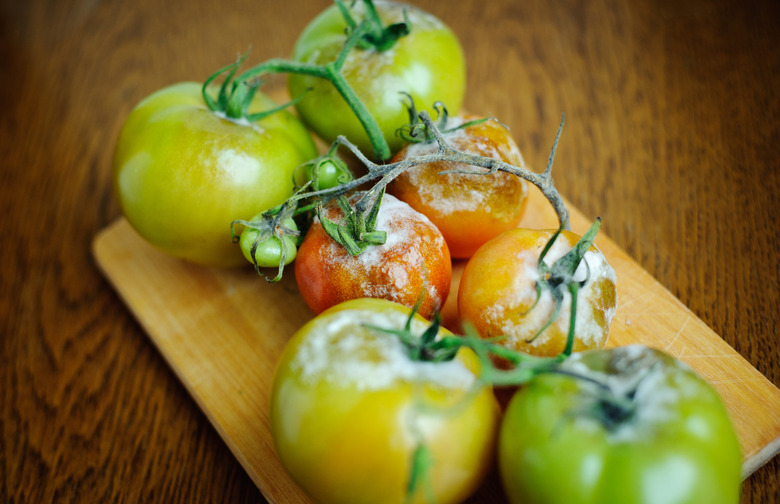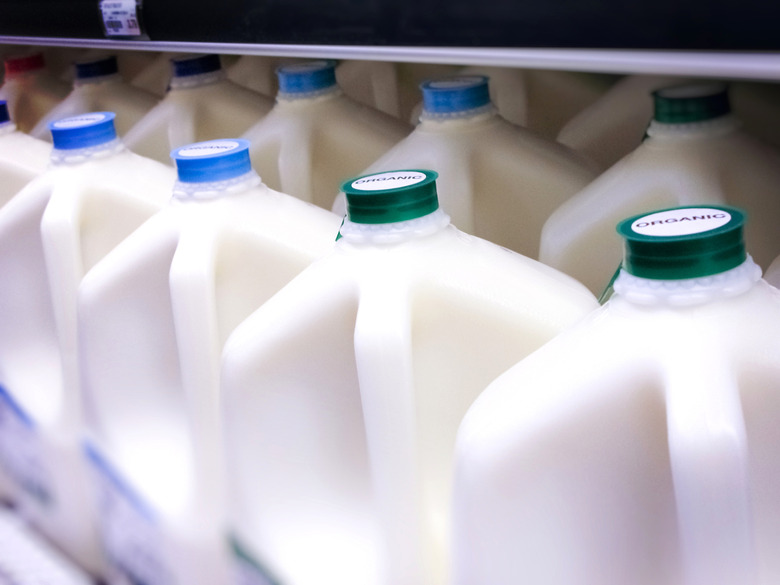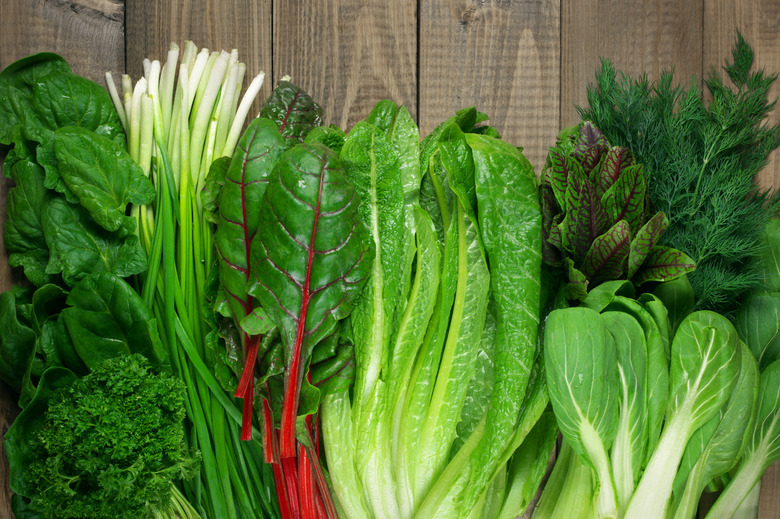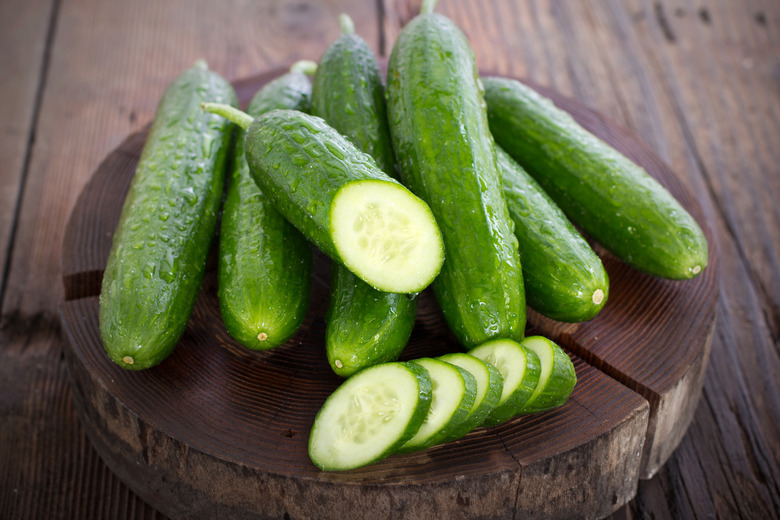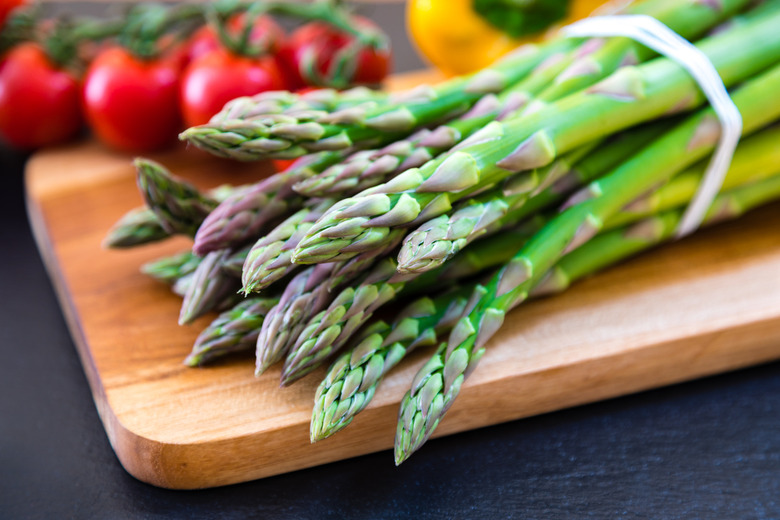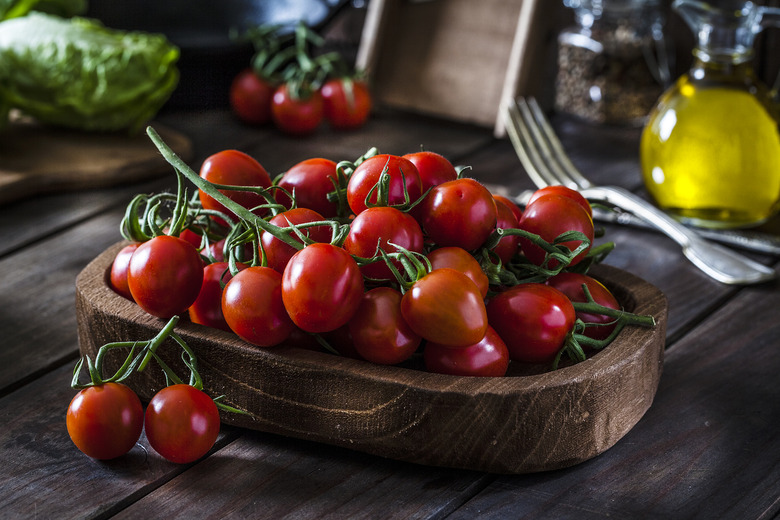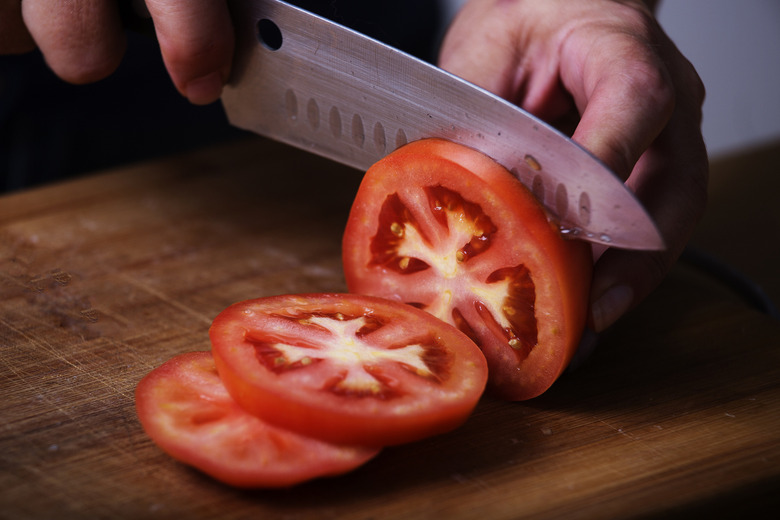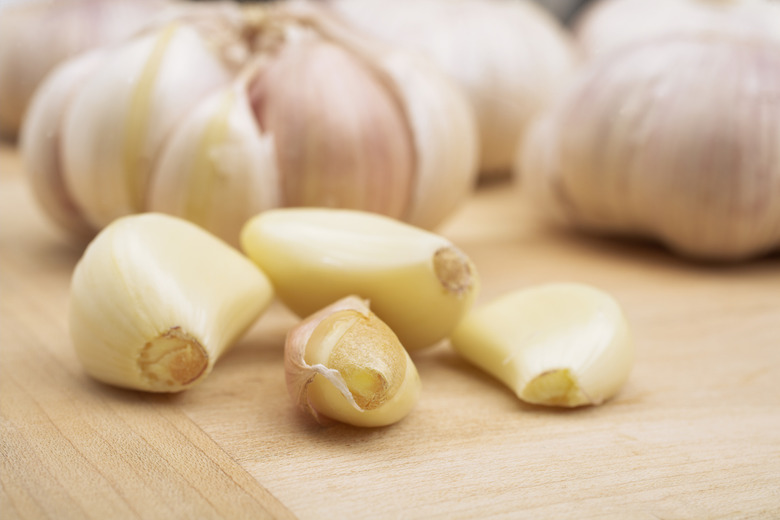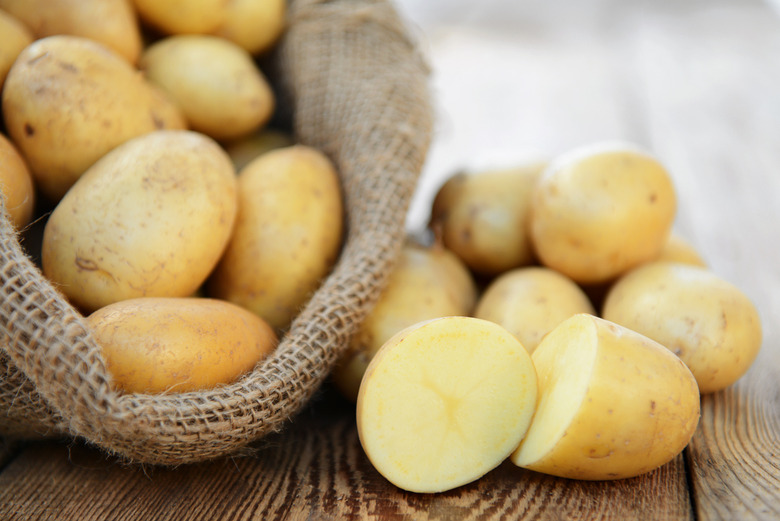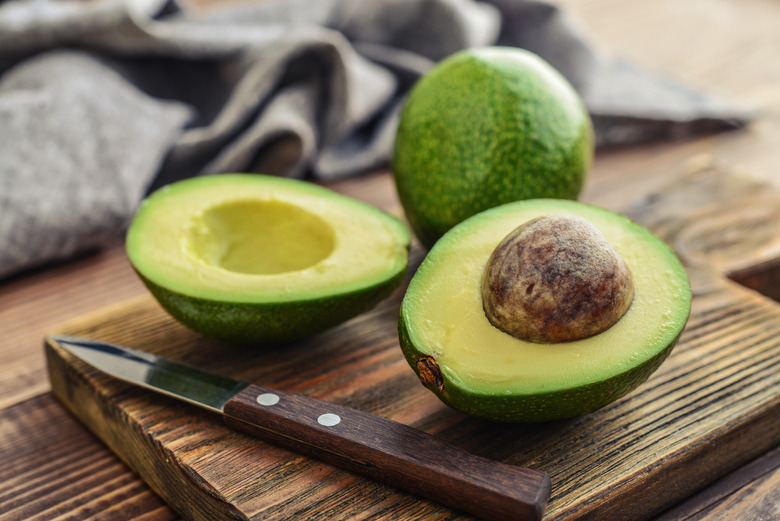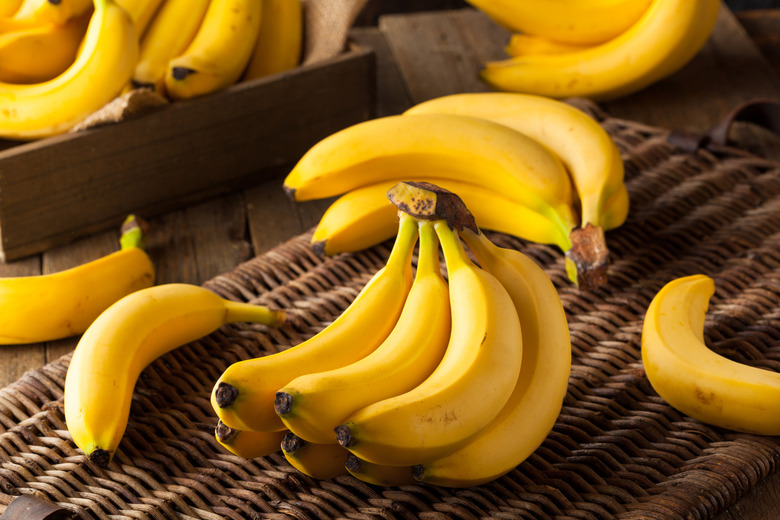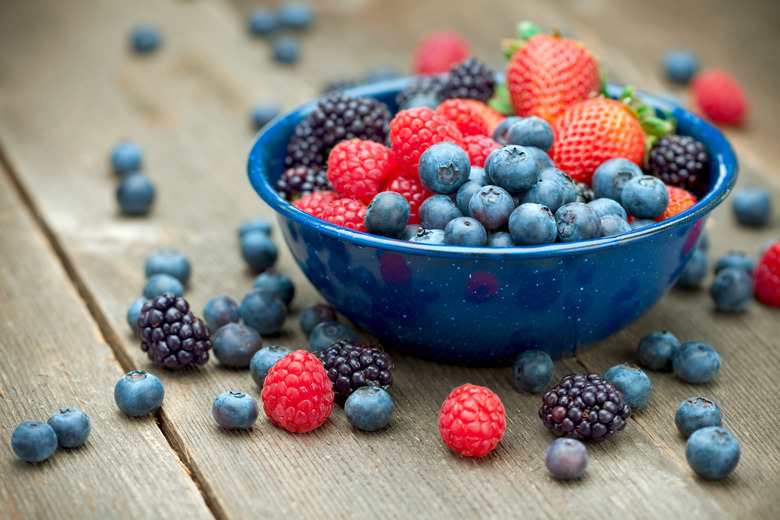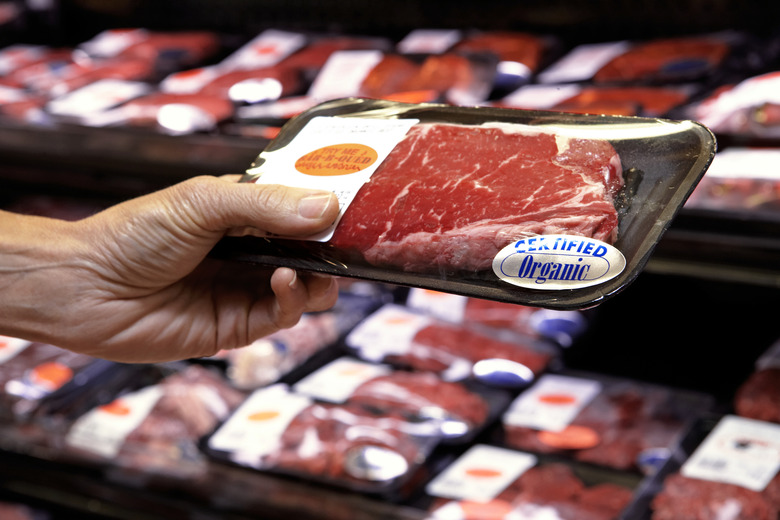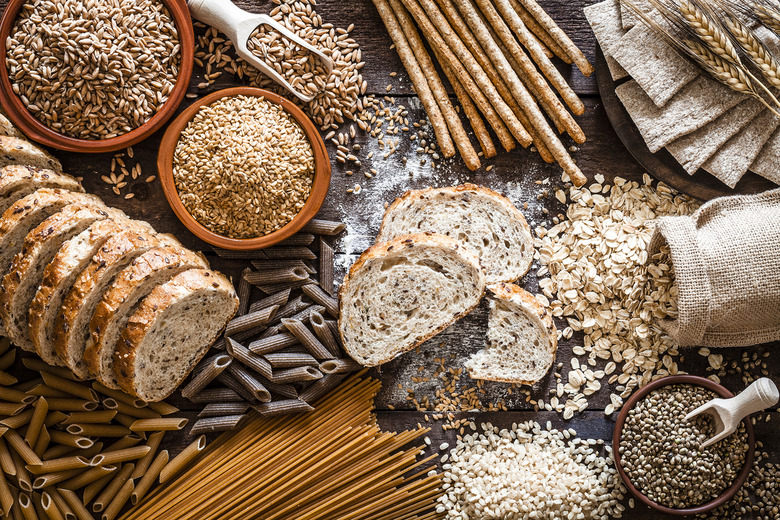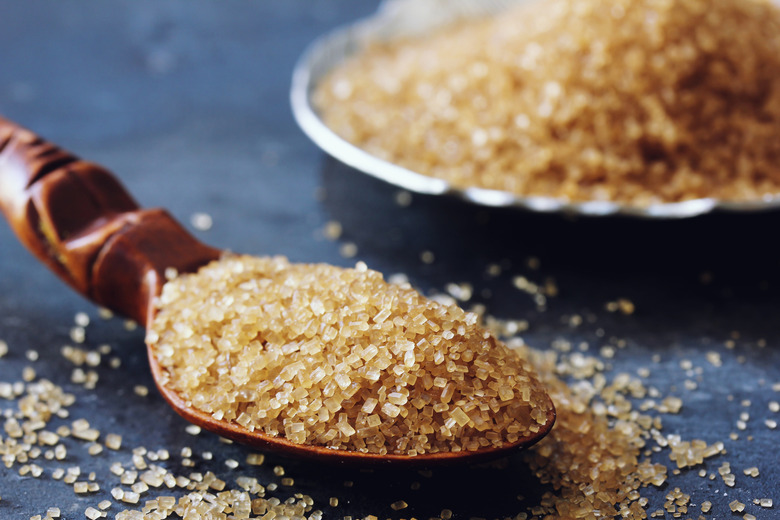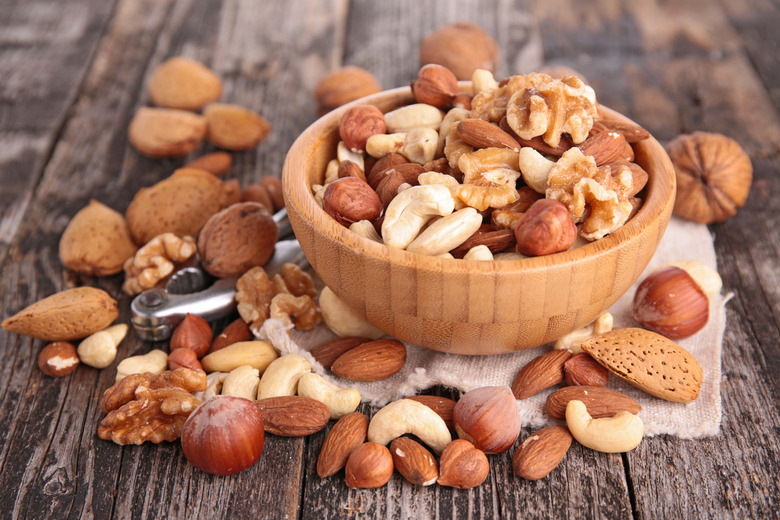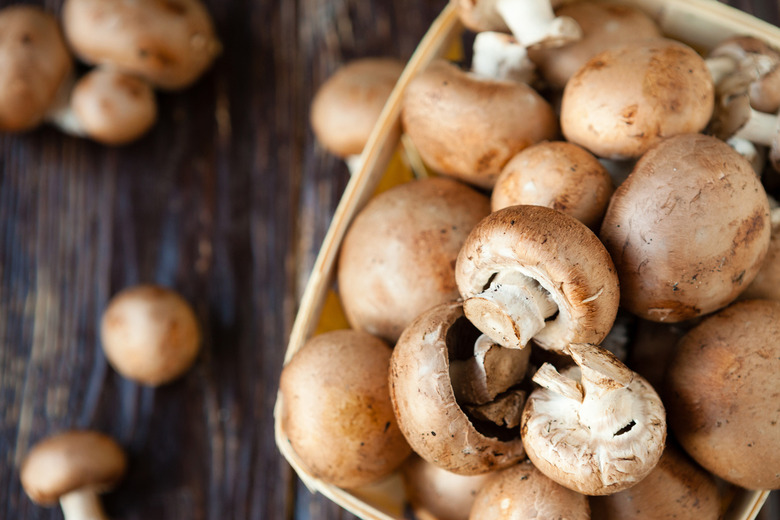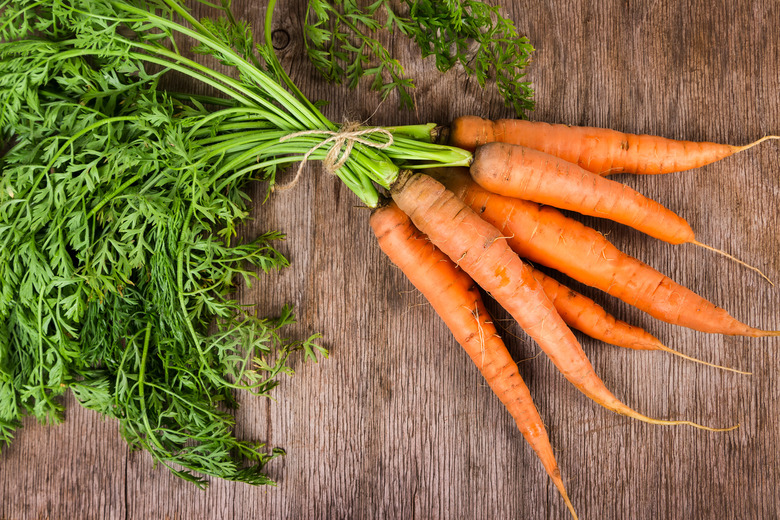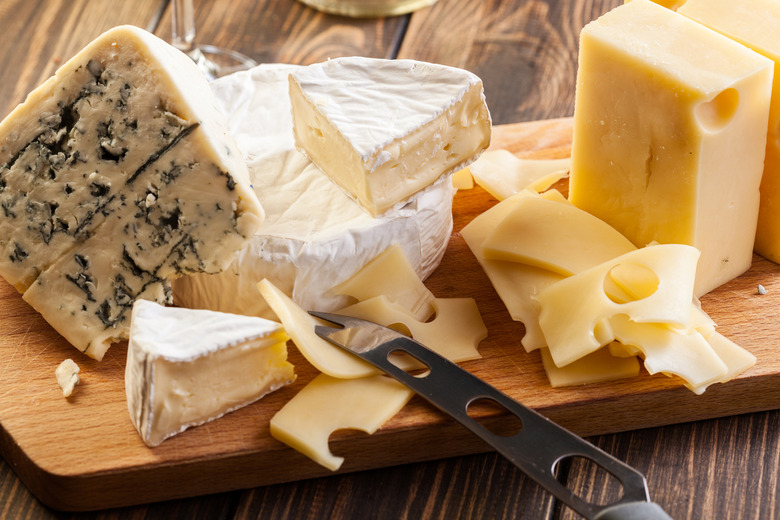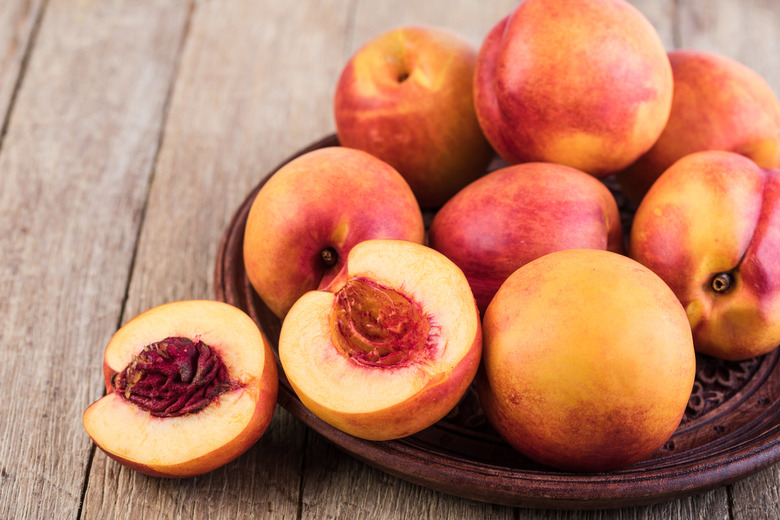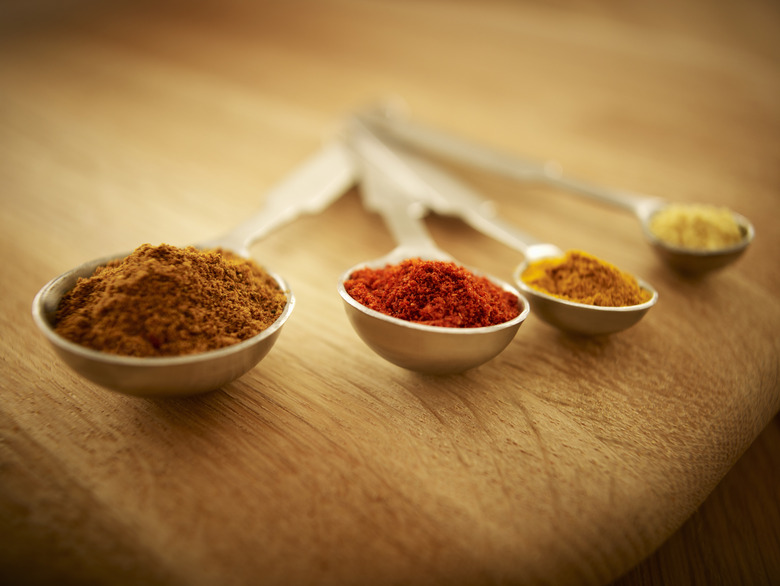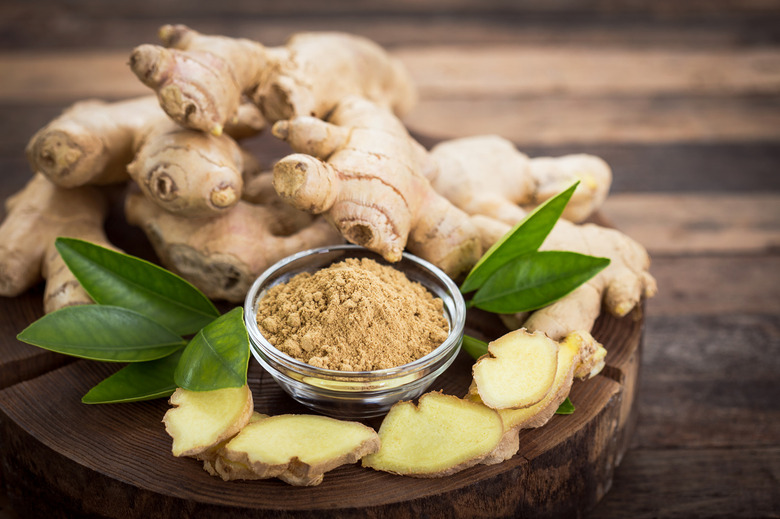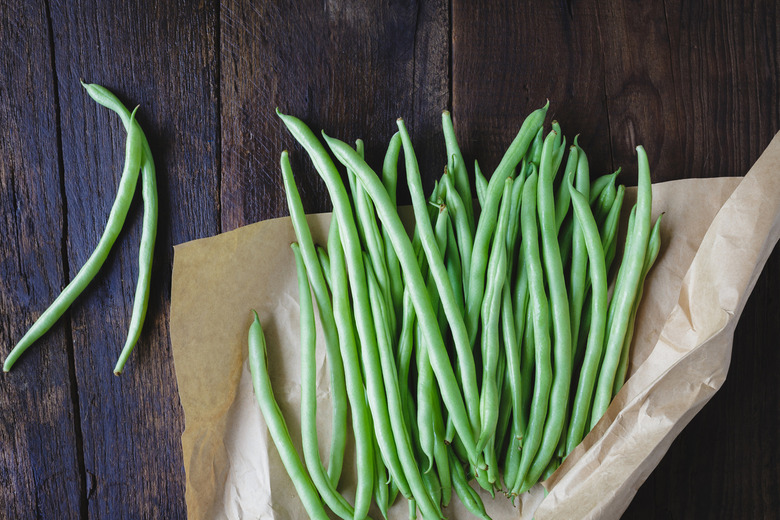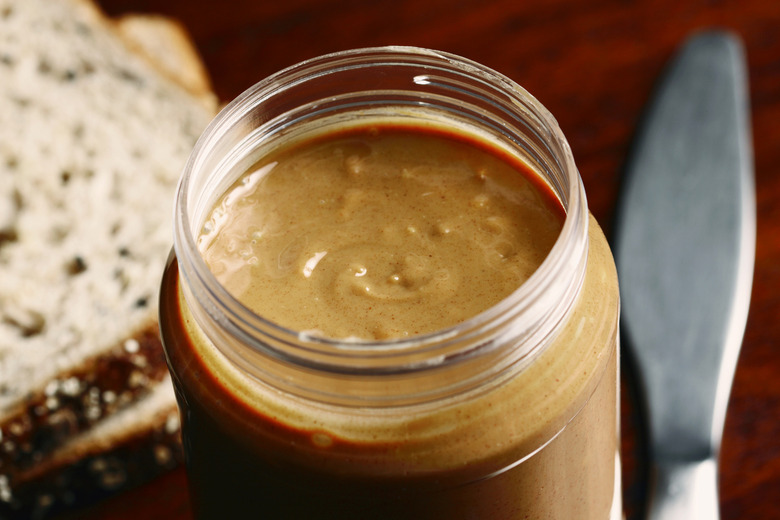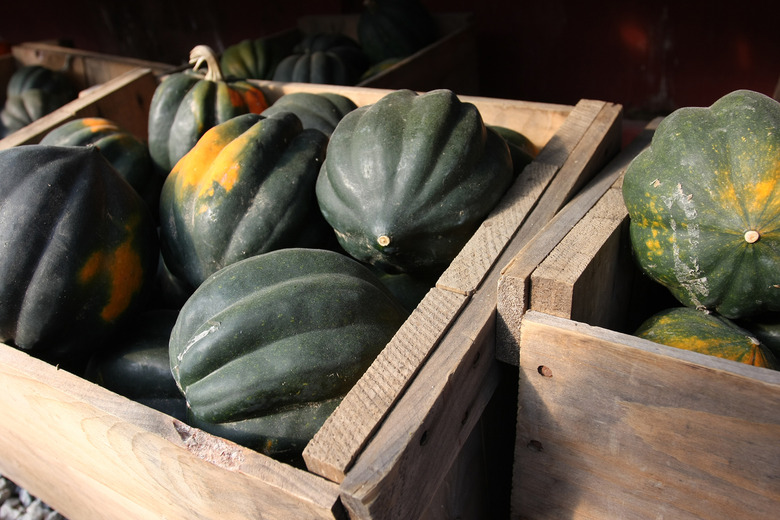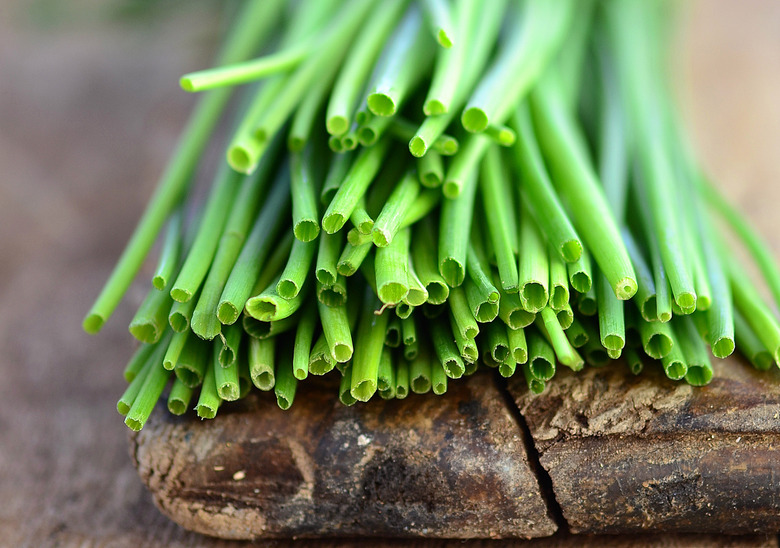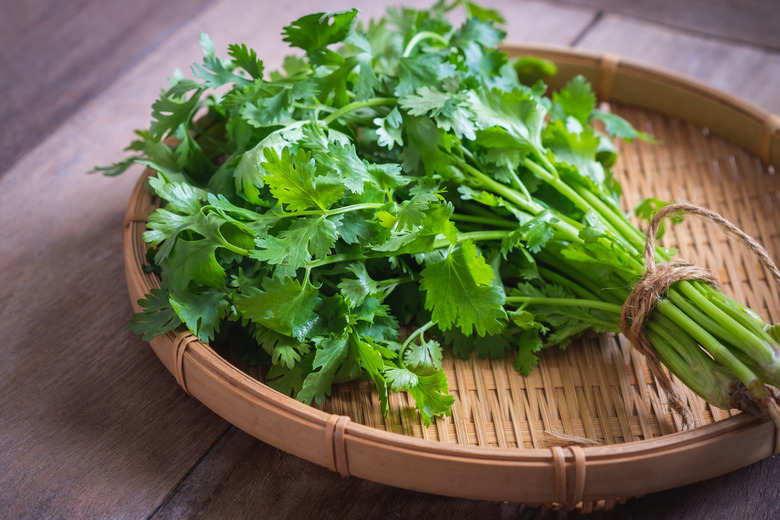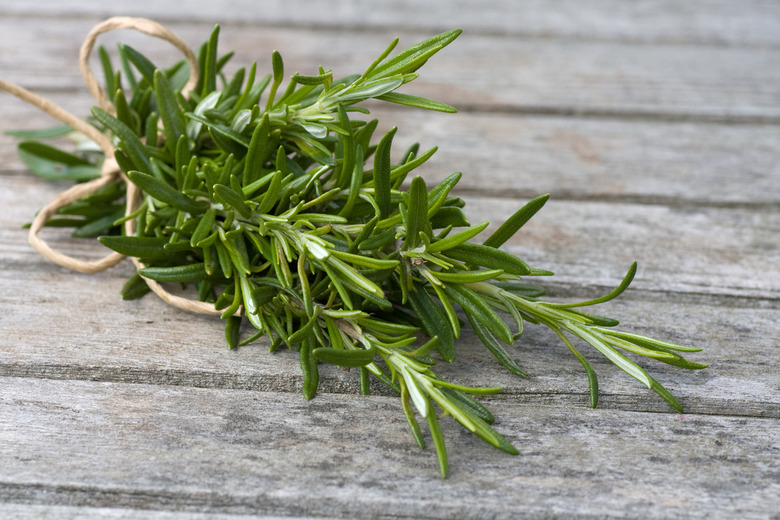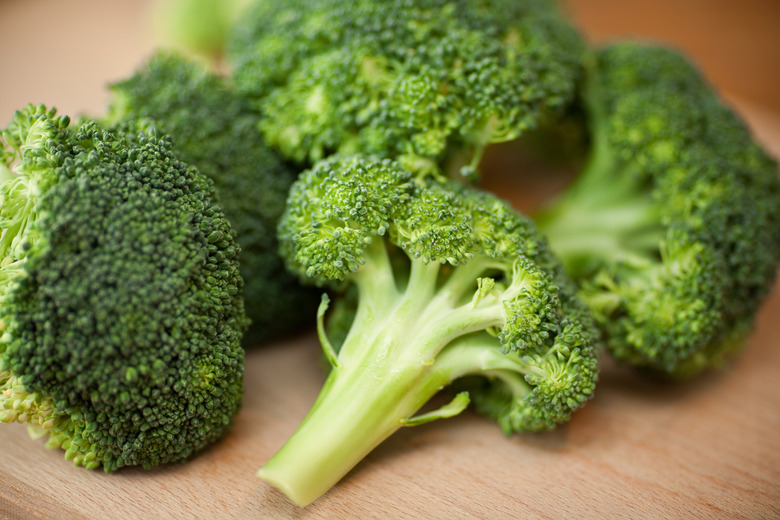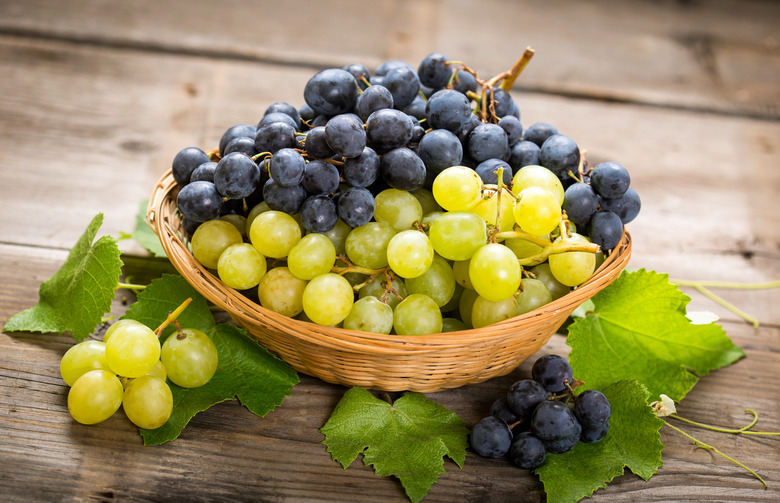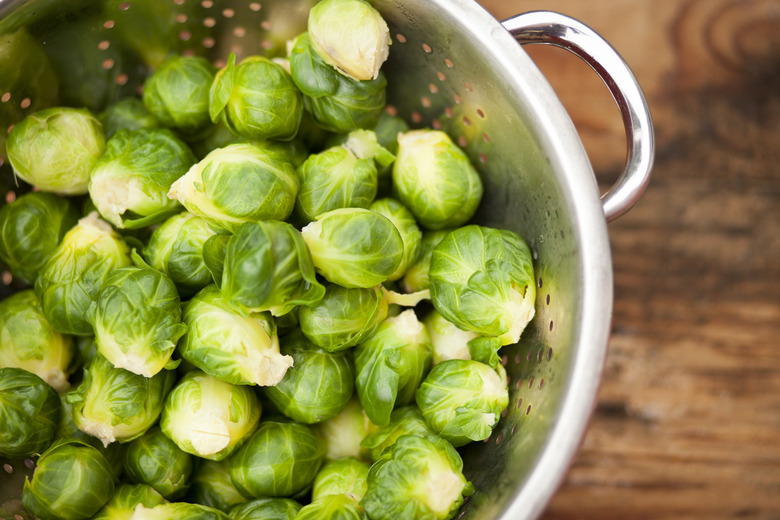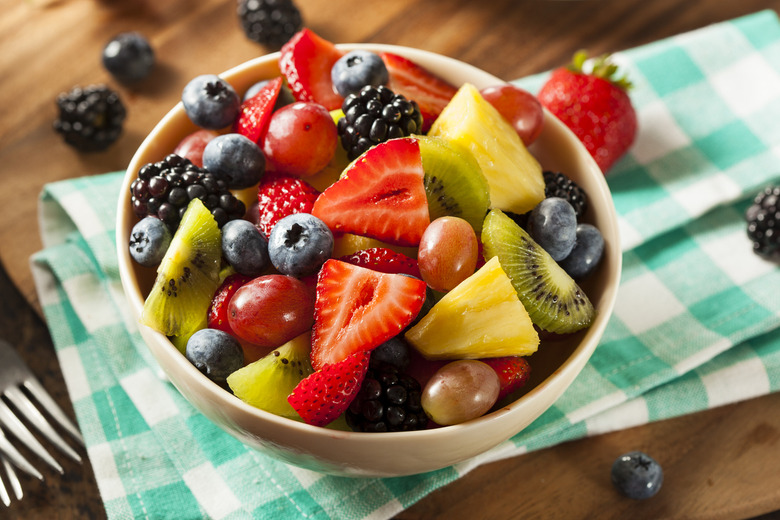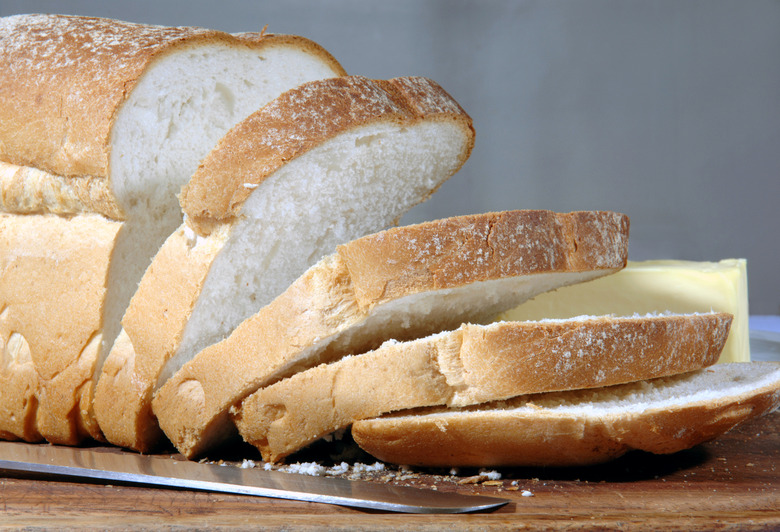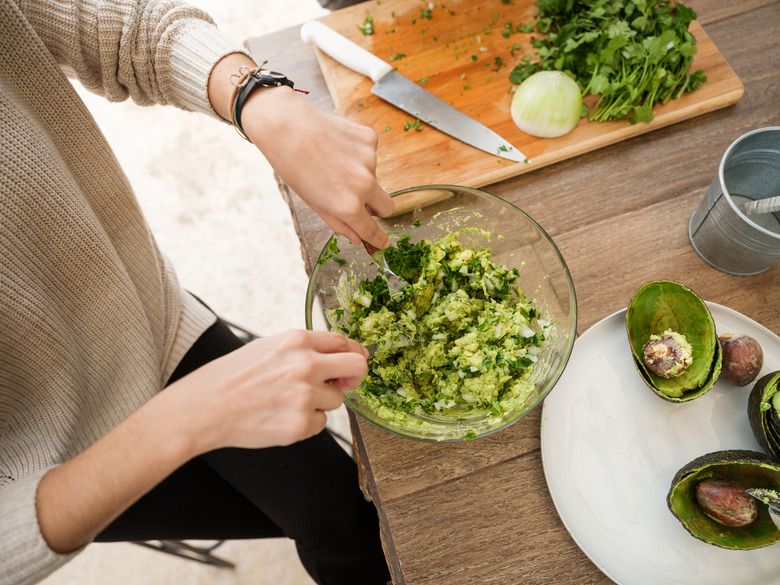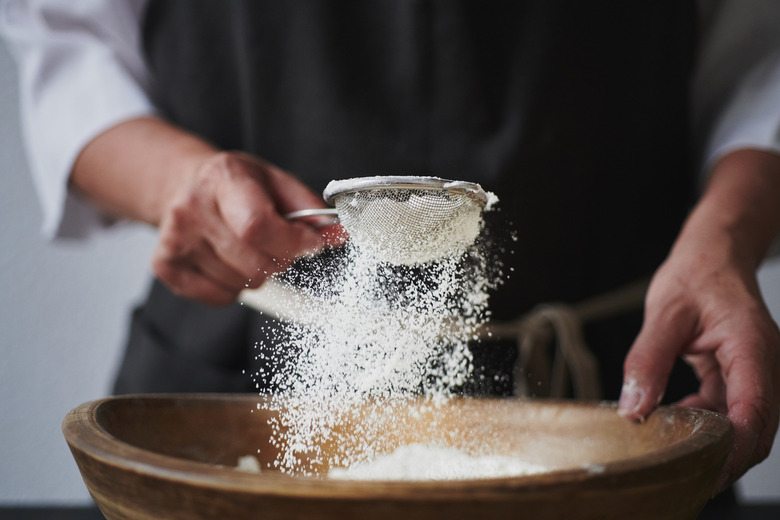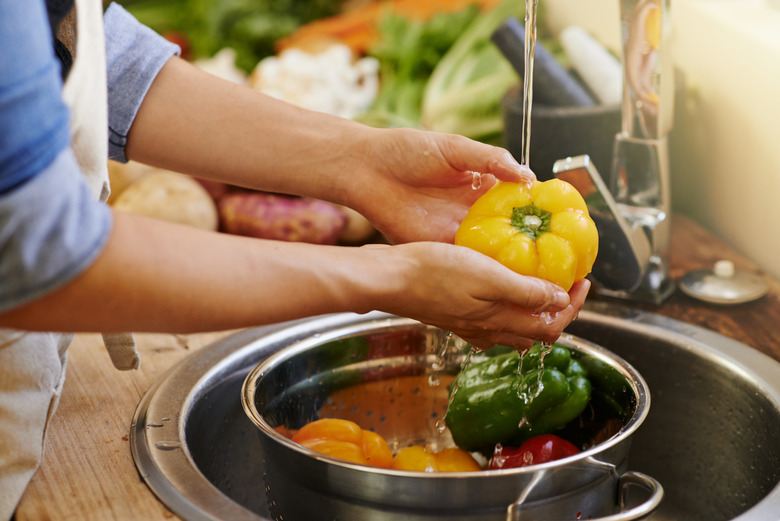You're Storing These Groceries All Wrong
There's nothing worse than getting all geared up to cook a delicious recipe, opening the fridge and realizing that your ingredients have gone bad. You can't make a perfect pasta dish with wilted basil, and that rotten onion sitting in the back of your fridge is not going to work. Either you have to run to the store or opt instead for a recipe you can make with whatever's in your freezer.
Here's some good news: The tragedy of spoiled food can be prevented. It's likely that your goods have gone bad because you aren't taking the right steps to store them. You're probably storing these groceries all wrong — here's how to store them correctly.
Milk
You might think that as long as your milk is refrigerated that it doesn't matter where you place it. But that's not really the case. If you store your carton of milk in your refrigerator door, you're making a mistake. Items on the shelves of the door are exposed to warm air every time you open the fridge. This could cause your milk to spoil more quickly. Instead, place milk and other dairy products at the back of your fridge. This will ensure they remain cold for longer. To use up your milk before its expiration date, try a recipe sure to use up a gallon of milk.
Salad greens
Salad greens, such as spinach, arugula and lettuce, are typically sold in plastic bags and boxes. Most people either use a bag clip to seal the opened bag or rely on the box itself to keep greens fresh. But you might have noticed that your salad greens go soggy and limp too quickly, developing a slimy residue at the bottom of the container. Make salads the whole family will love with fresher greens by making a small tweak in how you store them. Simply add a paper towel to the top of your box or bag of greens. The paper towel will soak up excess moisture and keep the leaves crisp, dry and fresh for longer.
Celery
Most people don't think twice about throwing their stalks of celery in the crisper drawer. But when stored loose or in a plastic produce bag in the fridge, celery can lose its crunch quite quickly. No one wants to eat a limp piece of celery. Instead, take a few extra seconds while putting away your groceries to wrap your celery in aluminum foil. It might sound strange, but the foil keeps in the right amount of moisture to ensure your celery stays hydrated and crisp. Additionally, the foil will serve as a barrier against ethylene gas released by other pieces of produce in the drawer, preventing celery from going brown as quickly.
Cucumbers
Most people will store a cucumber in the grocery store's plastic bag in a drawer of their fridge. But that's actually not the best call — cucumbers are optimally kept at room temperature. If it gets below 50 degrees Fahrenheit, a cucumber can go sour more quickly. Good news is, storing cucumbers is easy. Before it's sliced open, simply place the whole vegetable on your counter, and you'll be cool. Once you slice it open, however, it needs to go in the fridge. To prevent the inside of the cucumber from drying out in the fridge, dampen a paper towel and wrap the sliced cucumber. Then, place it in a resealable plastic bag.
Asparagus
You may be tempted to just leave the bunch of asparagus in the thin plastic bag you carried it home in. But asparagus spears take some tending to in order to keep them fresh. Like you would the stems of flowers, place the bottom of asparagus spears in a shallow pool of water. Stand the spears upright and cover the tips of the spears loosely with a plastic bag to protect them from contamination from other fridge odors. If you'd rather save that level of effort for a real bouquet, you can opt for an easier method. Simply wrap your bundle of spears in a damp paper towel. This will help the spears to retain moisture and keep from drying out too quickly due to refrigerator air.
Cherry tomatoes
Most people plop cherry tomatoes right into the fridge as soon as they pick them up from the grocery store, but that isn't the best move. To ensure your tomatoes taste sweet and are plump when you eat them, store them in a cool, dry place, allowing them to ripen naturally. A ripe cherry tomato will have a deep, uniform color (usually red, but sometimes yellow or orange) and a noticeable shine. Additionally, the tomato should feel tender to the touch. If the tomato is too soft and appears wrinkly, it's past peak ripeness and may not be good to eat. When your tomatoes are perfectly ripe, transfer them to the fridge in their perforated plastic container.
Tomatoes
This may seem sort of bizarre, but you should always store your tomatoes upside down in the fridge. This trick can keep them ripe for much longer. The stems of the tomatoes, which are actually a fruit, connect to what's called the scar of the tomato. When this stem is removed, air can transfer inside the tomato at the scar, causing it to go rotten faster. If the tomato stems are gone, storing them upside down can prevent air from getting inside.
Onions
Many people default to throwing whole onions in the fridge, but this is a bad idea. Place onions in a mesh bag and store them in a cabinet or pantry where the air will remain cool and dry. Onions last far longer this way; moisture can cause onions to rot quickly. Uncut onions should, ideally, last around two months. Additionally, you should avoid storing your onions directly beside potatoes. Both onions and potatoes release moisture, and a damp environment can speed up rotting. Once your onions are sliced open (hopefully done using a trick to prevent crying), you should transfer them to an air-tight container in your fridge.
Garlic
No matter how you buy your garlic, there's an optimal method of storage. Pre-peeled cloves should be kept submerged in vinegar and stored at room temperature. Whole, unpeeled heads of garlic should also be kept out of the fridge. The cloves have a dry outer layer that protects them from rot. Keep them in a mesh container, which they're often sold in, so that they can breathe. Place them in a cool and dry area of your kitchen; inside of a pantry or cabinet is ideal. Now that you know how to store garlic, you have no excuse not to eat some every day.
Potatoes
It may seem intuitive to store potatoes in the fridge to help them to last longer. But this can shorten their shelf lives by quite a bit and cut down on the number of scrumptious potato recipes you can make. Refrigerated, potatoes can quickly become bruised and mushy. The best place to store your potatoes is where you keep your onions: in a cool, dry place such as a cabinet or pantry. This keeps them safe from sunlight and excess heat, which can make them sprout more quickly. Another trick is to store apples beside your potatoes. The apples will be fine at room temperature and will release ethylene gas that prevents potatoes from sprouting.
Avocados
Avocados boost brain health and make a great addition at any meal, but timing the ripeness of an avocado can be tricky. Unripe avocados should be kept out on a kitchen counter at room temperature. Cut and use them as soon as they are ripe. You can tell an avocado is ripe by gently pressing on the outside. If it gives slightly, it's ready to eat. Once you cut open an avocado, the inside starts to brown quickly. Before you know it, you've let half of this precious fruit go to waste. Luckily, there's a way to save your other half before things turn for the worse. Before putting the avocado half back in the fridge, brush the open side with some olive oil and store it face-down in an airtight container. The olive oil helps by acting as a seal that blocks air from contacting the open end of the fruit. You can also brush it with lemon juice, which helps to slow oxidation, and wrap the avocado half in plastic wrap to let in as little air as possible.
Bananas
When you leave a bunch of bananas on the counter, they could remain green for days only to quickly over-ripen before you had a chance to use them. There are great ways to use overripe bananas — like homemade bana bread — but if you use a storage trick or two, you can keep your bananas at optimal ripeness for longer. You should never store your bananas in the fridge if you want them to ripen; refrigerating bananas stalls the ripening of the inside of the fruit while accelerating the time it takes for the peel to brown and dry out. However, if a banana has reached optimal ripeness, you can stick it in the fridge unpeeled for a day or two to preserve the state of the inside fruit. Additionally, there's a trick for keeping bananas on the counter. Simply wrap the crown of a bunch of bananas in plastic wrap. This slows the release of ethylene gas, slowing down the ripening process.
Berries
Most people keep berries in the containers they're sold in, hardly bothering to place a paper towel beneath the carton after rinsing them all off. However, there's a much better way to keep berries fresh so you can enjoy this immune-boosting food for longer. Before placing your berries in the fridge, rinse them with a light vinegar solution made from approximately one part vinegar to eight parts water. Drain them before putting them away so as not to introduce excess moisture. The vinegar will help to kill off excess bacteria and spores , which can grow quickly on the surface of berries, turning your fresh fruit to mush.
Meat
The flimsy paper and plastic wrapping around pre-packaged, fresh meat may allow for juices from the meat to leak through. If these drippings contaminate other food in your refrigerator, you could be in danger of food poisoning. One of the best ways to protect against getting sick is to store your meat on the bottom shelf of the fridge. That way, if any juices do fall through, they won't land on other food products.
Grains and pasta
Uncooked grains and pastas should always be stored in an airtight plastic or glass container. Whether you're storing oats, lentils, quinoa, rice or other pantry staples, it's crucial you keep them sealed with more than just a half-open and flimsy box. Common household pests such as mice and bugs can crawl into these containers easily, and excess moisture from the surrounding air may cause these items to go bad more quickly.
Brown sugar
Unless you bake homemade cookies on a regular basis, you probably don't go through brown sugar all that quickly. If stored improperly, brown sugar can become rock-hard and impossible to use due to the molasses it's made with. As molasses loses moisture, it hardens, causing the sugar to clump. To prevent this, add marshmallows in the same container. The marshmallows will actually retain moisture and keep your brown sugar powdery and separated for longer.
Nuts
You might think that nuts last forever, but they can go bad faster than you think. Don't make the mistake of storing nuts loosely at room temperature. Instead, place the nuts in an airtight container like a resealable plastic bag. You can store them at room temperature for up to three months, but any longer than that and you should place your bag of nuts in the freezer. There, they can last for a year or more. Storing in the freezer can also help save you money, since you can buy nuts in bulk as a way to cut down on grocery costs.
Lemons and limes
Sure, you can keep citrus fruits on the counter, but it is best to keep your lemons and limes in the refrigerator, most preferably in a plastic bag, for juicier fruits and a longer shelf life.
Mushrooms
Most people don't store mushrooms correctly. Rather than keep them in the container they come in or store them loosely in a plastic bag, you should always transfer your mushrooms into a brown paper bag before placing them in the fridge. The paper bag will absorb excess moisture so that your mushrooms don't get slimy or moldy.
Carrots
Whole carrots are sometimes sold with the green, flowery tops still on, and most people are inclined to just leave them. While you should wait to rinse off your carrots until you are ready to use them, you should remove the carrot tops right away. Carrot tops continue to suck the nutrients from your root vegetable, even after you've placed it in the fridge. This can turn crunchy and crisp carrots into a sad, wilted bunch.
Apples
An apple a day can keep the doctor away , but how do you keep brown spots away from your apple? There are a wide variety of apples, which are all fine to be kept on the counter, though they'll ripen and go mushy much faster. If you want your apple to stay crisp and crunchy for longer, place your apples in the fridge. Be careful what produce you store near them, though — apples release ethylene gas as they ripen, which can quicken the ripening of other fruits, including oranges, bananas and peaches.
Cheese
If you've invested in fancy cheeses from around the world, you don't want to let them go to waste. And if you store it in the airtight plastic wrapping it comes in, you just might be. Cheese needs to breathe, so ditch the plastic wrapping in favor of parchment or wax paper. These work to protect the cheese from picking up other flavors from odors circulating in your fridge but don't have the trapping effect of plastic. Another trick is to use olive oil. Brushing some olive oil on the open, cut surface of your cheese can help to trap moisture and protect your cheese from the surrounding air.
Stone fruits
Stone fruits, such as peaches, plums and apricots, shouldn't just be thrown in the fridge. You want the inside of your fruit to stay plump and juicy, and the inside of your fridge can dehydrate the skin and flesh of the fruit. Instead, store your stone fruit at room temperature on your kitchen counter. If you bought fruit that are underripe, there's a trick to make them ripen faster: Place the fruit in a brown paper bag. Adding a banana to the bag will accelerate the process even further.
Spices
You may have had that small container of oregano in your cupboard for years and years, but it might be time to clean out your spice cabinet. Believe it or not, spices can go bad. When spices expire, they start to lose flavor. If you store them correctly, however, you can hold on to those scrumptious spices for longer. Make sure that your spices aren't anywhere near your oven or stove. Heat can cause spices to dry out, and water vapor from the stove can infiltrate spice containers and cause them to clump. Instead, choose a cool, dry place that isn't exposed to sunlight like a cabinet or drawer. Ensure that your spices are stored in an airtight container. You might purchase your own small glass containers or simply use plastic bags.
Ginger
Using fresh ginger instead of powdered ginger can seriously elevate the flavor of a Thai curry noodle bowl, stir fry or other dishes from around the world. But you rarely use more than a tiny bit of ginger at a time, which means that when you buy a large piece, lots of the root can go to waste. If you store it wrong, you can end up with a wrinkled piece of ginger that's lost a lot of its flavor. If you know how to store it correctly, however, it can last for much longer. Pat dry any exposed part of the inside of the root before storing. Place the piece of fresh ginger in a resealable plastic bag. Squeeze out all of the air and seal. Store this bag in your refrigerator's crisper drawer.
Green beans
Fresh green beans should be strong and vibrant; ideally, they'll snap when you bend them. But store them wrong and you could end up with a bendy, brown strand instead of one of America's favorite vegetables. Keep your green beans in an unsealed plastic bag wrapped in a paper towel. Place the bag in your refrigerator's crisper drawer.
Nut butter
Eating nut butter can be a great way to add protein and healthy fats into your diet, but many of them tend to separate quickly. This can result in a thick layer of oil you have to viciously stir with the rest of the thick spread before eating. Luckily, the solution to this is simple. Store your nut butter upside-down so that the oil gathers on the bottom of the jar rather than the top. Then when you turn your nut butter upright and open it to eat, the thick, creamy part of the jar will be waiting for you on top.
Squash
Winter squash, like acorn squash or butternut, are perfect for making cozy soups and casseroles, but you may not know how to store the big, clunky gourds. Before you cut one open, you should store it in a cool, dry place at room temperature. You can set it on your kitchen counter, for example, or place it in your pantry. After you've sliced it, you can save part of the squash for later by wrapping the entire piece in aluminum foil. Place the wrapped portion in a refrigerator drawer, where it should stay ready to use for two or three weeks.
Chives
Left haphazardly in your fridge, chives can easily dry out and leave you garnishing your simple weeknight dinners with withered, tasteless stalks. However, there's a way to store chives that keeps them fresh and hydrated for longer. Simply take a small glass jar and add a few inches of water to the bottom. Place the bottom end of the chives into the water at the bottom of the jar, leaving the tops poking out of the top. Do not wash the chives before placing them in the jar, as the excess moisture can end up speeding up the stems' decay. Cover the chives and the jar with a plastic bag — no need to refrigerate.
Soft herbs
Fresh herbs are worth investing in at the store or even growing at home — a few freshly picked leaves can add a lot of flavor to a dish. But you typically only use a few leaves at a time. And too often, the rest of those fresh herbs you've picked or bought turn brown and wilt before you're able to use them. Often, this is due to improper storage. With too much moisture, herbs get slimy; not enough moisture, and they'll dry out. There are some tricks to storing herbs correctly. Soft herbs include herbs such as cilantro, basil and parsley that have soft, easily broken leaves. Treat these herbs like you would a bouquet of flowers. Trim the ends of the herbs and place them in a small jar with a few inches of water or other container with the leaves facing up. Basil can be left on your counter at room temperature. Change the water every couple of days to make sure it's clean. All other types of soft herbs should be placed in the refrigerator in their makeshift "vase." Cover the tops with a plastic bag before storing to prevent the leaves from losing moisture to the dry refrigerator air. Stored this way, your herbs will ideally last a couple of weeks.
Tough herbs
Tough herbs (rosemary, oregano and thyme, for example) are an entirely different story. These herbs should first be wrapped in a damp paper towel. This ensures the herbs retain moisture. Then, place them in a resealable plastic bag or other airtight container and store them in your fridge.
Cabbage
If you're buying your cabbage pre-shredded, you're messing up. Pre-cut vegetables of any kind are one of the grocery items you should stop buying. Buying cabbage whole shaves lot of cash from your grocery bill — so long as you know how to store it. Once you slice open a cabbage, the exposed end is in danger of oxidation. To protect against oxidation, simply cover the open end with a light layer of lemon juice. It won't last forever, but this tip will help maintain the integrity of your cabbage.
Broccoli
When stored in a plastic bag that doesn't allow broccoli to breathe, the cruciferous vegetable can end up growing bacteria and slimy residue. And if you store it loose in the fridge, the dry air of the surrounding environment can suck all the crispness from your stalks and leave you with a limp, dried out mess. So what are you to do? It's simple: Buy perforated bags, either reusable or disposable. The perforation will allow the broccoli room to breathe while the bag will help to retain moisture. The same method works for cauliflower.
Grapes
Grapes can last a while in the fridge no matter how you store them, but there are a few things you might not be doing to ensure optimal freshness. For one, you should try and keep grapes away from items in your fridge that may give off an odor. The skin of grapes can easily pick up flavor and smells from nearby items. Additionally, you should store the grapes in the back of the fridge where the temperature is lower. This will slow their ripening process.
Brussels sprouts
You probably have been storing Brussels sprouts by leaving them in your fridge in a bag, but there's actually a better way. Leave your Brussels sprouts in a bowl or other open container with the outer leaves left on. This will prevent the leaves from getting brown and slimy, while the outer leaves of the sprouts protect the inner layers from going bad. Then, when you cook your perfect batch of Brussels sprouts, your leaves will be crisp and fresh.
Fruit salad
Fruit salad is a classic summer side dish, but no one will want any once it starts getting all mushy and brown. There's a quick trick to prevent this from happening though. Simply use a bit of citric acid from lemon or lime juice. Sprinkle it over the top and protect your rainbow-colored fruit bowl from going brown.
Bread
A common misconception is that bread will last longer if it's kept in the fridge. But storing your loaf of bread in this dried out, chilled compartment of your kitchen is a form of self-sabotage. The harsh refrigerator environment can cause bread to go stale faster. Bread keeps longest when it's kept at room temperature and is not pre-sliced, so buy whole loaves of bread and slice them yourself if you can. It's also important to balance the humidity surrounding your loaf of bread to prevent it from going stale and from growing mold. Keep your loaf of bread in a breadbox if you have one. If not, the next best thing is to keep it tightly wrapped in a plastic bag.
Guacamole
Left open in the fridge, guacamole will go brown quickly. There are two ways to prevent the tragedy of spoiled guac. One, you could make guacamole that's too good not to finish in one sitting. Two, you could use a simple trick to keep it from spoiling. Simple flatten the top layer of your guacamole to get rid of air bubbles and pour about a half-inch of water over the top. When you're ready to serve, pour the water off the top and stir. Your guacamole will be good as new.
Flour
After you open a large bag of flour for your baking adventures, what do you do with the rest of it? If you simply crumple down the top and stick it back in the pantry, you're making a mistake. Tiny bugs can infiltrate your baking supplies and hide in the flour. The little black critters can be tough to detect. Left exposed to air, flour can also oxidize and go bad faster. Instead, make sure your flour is stored in a container with a sealable and airtight lid.
Fresh produce
You definitely want to wash your produce before you eat it, but don't wash it all at once. While it may save time later to wash your fruits and vegetables all at the same time, it could cost you your leftovers. Storing produce after rinsing can increase the rate that it spoils or grows mold due to the cold, damp environment this creates. Instead, wait until you are ready to eat or cook with your fresh produce — then wash it. Speaking of produce, you should also make sure to buy fruits and vegetables that are in season. They taste best during certain times of year — so before hitting the grocery store, take a look at a guide to what's in season each month.
More from The Daily Meal:
How to Use Leftover Rice, Vegetables, Pasta and More
Best Slow Cooker Chicken Recipes to Make at Home
The Best Mac and Cheese Recipes
